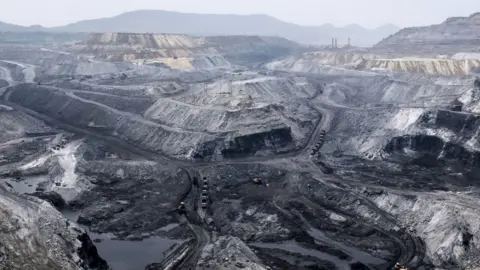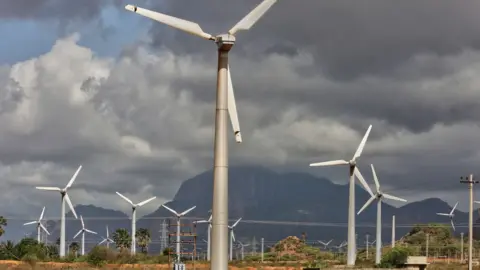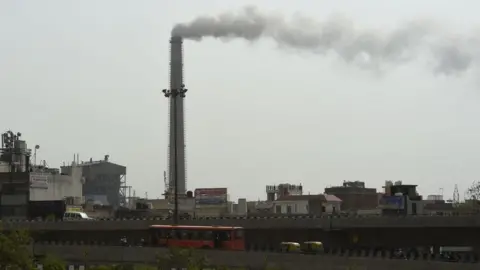Paris Agreement: Will India lose millions of carbon credits?
 Getty Images
Getty ImagesOne of India's main goals at the recent UN climate talks or COP25 was to win the right to sell the carbon credits it has earned over the years.
But the talks ended in Madrid on 15 December without agreeing on rules for future carbon trading, leaving the fate of billions of carbon credits on the line. This is a bad sign for India.
Carbon trading is a market-based system to reduce greenhouse gases contributing to global warming, particularly carbon dioxide. Countries and companies that earn carbon credits by cutting emissions can then sell those credits for money.
India had earned hundreds of millions of carbon credits or emission reduction certificates (CERs) by investing in low-carbon intensive technologies, switching to renewable energy and protecting forests. But since this happened under an earlier climate agreement - the Kyoto Protocol - the meeting in Madrid was expected to finalise rules for a new global carbon market as part of the Paris Agreement.
'A key issue for us'
India is the world's third-largest emitter of greenhouse gases, and it earned a lot of money by selling its carbon credits in the international market. But it still has hundreds of millions of CERs left over that it wants to sell.
"It is one of the key issues for us," Ravi S Prasad, India's chief negotiator, told the BBC.
"Our private sector all these years has invested so much in low-carbon technology and renewable energy because we were continually assured that we would get to sell the carbon credits."
 Getty Images
Getty ImagesIndia is not alone in its demand to carry over old carbon credits.
Brazil, Japan and Australia all have carbon credits that they want carried over into the Paris Agreement.
Carbon trading vs climate change
COP25 kicked off with strong calls for countries to slash their carbon emissions, amid findings that they need to do five times more than what they have pledged to avoid climate change. Many countries argued that carrying carbon credits racked up in the Kyoto era would not help the larger, more pressing fight against global warming. In fact, research has indicated that some carbon trading schemes have created more emissions than they have actually curtailed.
"There is a strong sense of urgency among many countries here for a significant increase in carbon-cut targets," said Brad Shallert, deputy director of International Climate Cooperation, WWF-US. "They believe that a carry-over of carbon credits will not let that happen."
 Getty Images
Getty ImagesThe world has already warmed more than one degree Celsius from what it was before the industrial revolution and scientists have warned current emission levels will make it more than three degrees warmer, leading to catastrophic climatic change.
But countries like India and Brazil argue that not honouring what was agreed in the Kyoto Protocol would not help either.
"It's an issue of trust," Mr Prasad said. "If they are not honouring that past commitment, what is the guarantee that the commitments we make under the new climate regime will be honoured?"
Who gets the credit?
Disagreements over the rules of carbon trading are also a major obstacle for India.
At the heart of this issue is double counting, when both buyers and sellers claim the carbon credit. For instance, if a country or company sells the credit it has earned by building a solar park, the buyer offsets their carbon emissions in the credit they bought.
But if the seller also counts the credit in their favour, it's called double counting - and critics say that it lets countries off the hook from making meaningful emission reductions.
Since there is no agreement on the overall carbon market, India will not be able to secure a separate deal for carrying over credits because they will have to be bought and sold in the same market.
When countries meet next at COP26 in Glasgow in 2020, these issues will be back on the table.
And India will be back where it began, trying hard to sell its old carbon credits in the new climate regime.

What are carbon credits?
- Carbon credits are a global scheme aimed at reducing the amount of greenhouse gases released into the atmosphere
- It is best described as a permit that can be purchased by a company so that it can emit a certain amount of carbon dioxide on the understanding that any damage to the environment is being offset by another company elsewhere in the world
- The scheme allows developing countries to sell the carbon whose emissions they have avoided by installing less-polluting equipment in industries, switching to renewable energies or protecting forests
- Richer countries can buy carbon credits to offset their own emissions

